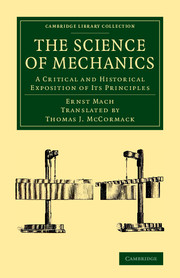Crossref Citations
This Book has been
cited by the following publications. This list is generated based on data provided by Crossref.
SCHAFFNER, KENNETH F.
1974.
EINSTEIN VERSUS LORENTZ: RESEARCH PROGRAMMES AND THE LOGIC OF COMPARATIVE THEORY EVALUATION.
The British Journal for the Philosophy of Science,
Vol. 25,
Issue. 1,
p.
45.
ZARET, DAVID
1979.
Absolute Space and Conventionalism.
The British Journal for the Philosophy of Science,
Vol. 30,
Issue. 3,
p.
211.
Gendler, Tamar Szabó
1998.
Galileo and the Indispensability of Scientific Thought Experiment.
The British Journal for the Philosophy of Science,
Vol. 49,
Issue. 3,
p.
397.
Espinoza, Miguel
2000.
Philosophies de la nature.
p.
465.
Belot, Gordon
2005.
Dust, Time and Symmetry.
The British Journal for the Philosophy of Science,
Vol. 56,
Issue. 2,
p.
255.
Zimba, Jason
2008.
Inertia and Determinism.
The British Journal for the Philosophy of Science,
Vol. 59,
Issue. 3,
p.
417.
Coffey, Kevin
2014.
Theoretical Equivalence as Interpretative Equivalence.
The British Journal for the Philosophy of Science,
Vol. 65,
Issue. 4,
p.
821.
2016.
Exploratory Causal Analysis with Time Series Data.
Tal, Eran
2016.
Making Time: A Study in the Epistemology of Measurement.
The British Journal for the Philosophy of Science,
Vol. 67,
Issue. 1,
p.
297.
Gryb, Sean
and
Thébault, Karim P. Y.
2016.
Time Remains.
The British Journal for the Philosophy of Science,
Vol. 67,
Issue. 3,
p.
663.
Boyd, Kenneth
and
Heney, Diana
2017.
Peirce on Intuition, Instinct, & Common Sense.
European Journal of Pragmatism and American Philosophy,
Vol. IX,
Issue. 2,
Samaroo, Ryan
2018.
There Is No Conspiracy of Inertia.
The British Journal for the Philosophy of Science,
Vol. 69,
Issue. 4,
p.
957.
Wallace, David
2020.
Fundamental and Emergent Geometry in Newtonian Physics.
The British Journal for the Philosophy of Science,
Vol. 71,
Issue. 1,
p.
1.
Franco, Marco P. Vianna
2020.
The Factual Nature of Resource Flow Accounting in the Calculation in Kind of the “Other Austrian Economics”.
OEconomia,
p.
453.
Huang, Zhanchao
Li, Chunjiang
Huang, Zhilong
Wang, Yong
and
Jiang, Hanqing
2021.
AI-Timoshenko: Automatedly Discovering Simplified Governing Equations for Applied Mechanics Problems From Simulated Data.
Journal of Applied Mechanics,
Vol. 88,
Issue. 10,
Schurz, Gerhard
2021.
Erkenntnistheorie.
p.
233.
Shi, Chongguang
Zhu, Chengxiang
You, Yancheng
and
Zhu, Guangsheng
2021.
Method of curved-shock characteristics with application to inverse design of supersonic flowfields.
Journal of Fluid Mechanics,
Vol. 920,
Issue. ,
Hetzroni, Guy
2021.
Gauge and Ghosts.
The British Journal for the Philosophy of Science,
Vol. 72,
Issue. 3,
p.
773.
Fehlinger, Sebastian
and
Liebchen, Benno
2023.
Collective behavior of active molecules: Dynamic clusters, holes, and active fractalytes.
Physical Review Research,
Vol. 5,
Issue. 3,
Zhilin, Pavel A.
2023.
Modeling of the electromagnetic field based on rational mechanics approach.
ZAMM - Journal of Applied Mathematics and Mechanics / Zeitschrift für Angewandte Mathematik und Mechanik,
Vol. 103,
Issue. 4,



